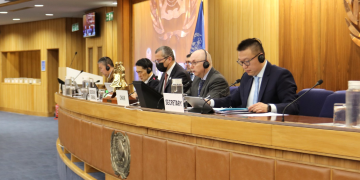WSC issues survey results for containers lost at sea The World Shipping Council (WSC) issued its updated survey results on containers lost at sea for six year period from 2008 to 2013. The survey results showed that there were 546 containers lost on average each year.In 2013, the international liner shipping industry carried approximately 120 million containers packed with cargo, with an estimated value of more than $4 trillion. Proper packing, stowage and securing of containers is very important to the safety of a container ship, its cargo and its crew, to shore-based workers and equipment, and to the environment. Even with proper packing of the cargo into the container, proper container weight declaration, and proper stowage and securing aboard ship, a number of factors ranging from severe weather and rough seas to more catastrophic and rare events like ship groundings, structural failures, or collisions can result in containers being lost at sea.Obtaining an accurate assessment of how many containers actually are lost at sea has been a challenge. There have been widely circulated, but unsupported and grossly inaccurate statements that the industry might lose up to 10,000 containers a year at sea. A number of submissions to the International ...
Read moreDetails































































